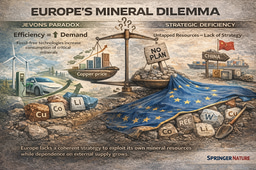The Ripple Effects of Drought
Published in Social Sciences

Climate change is reshaping our world in ways we could not have imagined only a few decades ago. One example is drought. The IPCC reckons that droughts will become more severe and frequent in several regions. While research provides great insights into drought’s impact on the environment and economy, a less explored area is its influence on social behaviors, particularly our willingness to cooperate with others. A key mechanism of cooperation is altruism - the willingness to provide a benefit to someone else even at a cost to oneself.
In a new study published in the journal Nature Climate Change (Döring & Hall 2023), we examine the impact of drought on altruism. Our point of departure arises from distinct literatures. First, there is a growing interest in the drivers of altruism generally (Rhoads et al., 2021) and particularly among those affected by armed conflict (e.g. Bauer et al. 2016; Hall et al. 2021). Second, we considered literature on climate-conflict links, which rarely addresses cooperative outcomes (Döring 2020; von Uexkull & Buhaug 2021). Our research speaks exactly to the intersection of climate change and social cooperation within and between groups divided by conflict.
Specifically, we focused on refugees from Syria and Iraq. Some of these refugees live in camps, while others are part of communities outside of camps. Nearly 40% of the respondents in our surveys experienced drought conditions before they left their homes. Both Syria and Iraq are situated in water-scarce regions where droughts are common. At the same time, both countries have been torn apart by years of fighting, which has implications for group identities and intergroup relations. This allows us to study how differences in drought interact with group identities to influence people's willingness to help others in the wake of armed conflict.
***
The survey takes into account the age, education level, gender, socioeconomic status, and potentially traumatic war-related experiences of the respondents. To measure drought exposure, we used a widely accepted index known as the SPEI, and we matched the drought conditions to the year each respondent said they left their home. We considered several approaches to capturing the extent and impact of the drought, such as rainfall patterns and effects on agricultural crops. To assess altruism, we measured how much a person is willing to trade off their own welfare for the welfare of someone else using a simple welfare game (Delton & Robertson 2016).
Our results suggest that previous exposure to drought decreased the general level of altruism among the respondents. Simply put, having endured droughts made people less willing to compromise their own welfare for the benefit of others. This finding resonates with the psychological impact of scarcity: when resources become scarce, people tend to prioritize their own needs over the needs of others. Moreover, we found this decrease in altruism was especially evident in areas with crops dependent on rainfall, suggesting a wider societal impact of drought and its potential to exacerbate conflicts.
But here is another layer to consider. Our findings also suggest the identity of the person in need plays an important role. Specifically, when conditions were drier, participants were more altruistic towards ethno-religious in-group members than out-group members. This was especially true if the decision-maker in the welfare game and the target of altruism belonged to different groups with an antagonistic relationship resulting from years of conflict, in this case Sunni and Shia Arabs. Yet, this bias faded as drought conditions eased. In other words, exposure to drought decreased altruism overall, but this decrease was more pronounced towards out-group members, especially when the groups involved have a history of conflict . This indicates that existing tensions can heighten the negative impact of drought on altruism.
***
Our research highlights how resource scarcity caused by climate change could potentially exacerbate social cleavages. We found that as a result of the experience of drought, people were more willing to help others from their own group than those from different ethno-religious groups. This shows that climate change could indirectly contribute to societal tensions, particularly in places affected by conflict and division. Thus, we stress the importance of developing strategies to foster cross-group cooperation and empathy in the face of climate-induced hardships, and especially where they co-occur with other external shocks.
To sum up, our findings support the idea that exposure to drought can exacerbate ethnic divides and promote what is known as parochial altruism — cooperation directed towards the in-group. This aligns with theories suggesting that scarcity can increase in-group favoritism, while also underlining the role of historical conflicts and antagonisms in moderating the impact of drought. Our findings are also important because they shed light on a previously underexplored area: the impact of slow-onset climate change events, like drought, on cooperative behaviors such as altruism. As we grapple with the challenges of climate change, understanding these social and psychological impacts will be crucial in crafting effective policies and intervention strategies.
We have only just started to uncover the complex relationships between climate change, cooperation, and group identity. There is much more to learn about what behavioral and environmental factors interact and affect one another. As we continue to find ways to adapt to a changing climate, it is crucial that we keep exploring social implications to build more resilient, empathetic, and cooperative communities.
***
References:
-Bauer, M., Blattman, C., Chytilová, J., Henrich, J., Miguel, E., & Mitts, T. (2016). Can War Foster Cooperation? Journal of Economic Perspectives, 30(3), 249–274.
-Delton, A. W., & Robertson, T. E. (2016). How the mind makes welfare tradeoffs: Evolution, computation, and emotion. Current Opinion in Psychology, 7, 12–16.
-Döring, S. (2020). From Bullets to Boreholes: A Disaggregated Analysis of Domestic Water Cooperation in Drought-prone Regions. Global Environmental Change, 65, 102147.
-Hall, J., Kahn, D. T., Skoog, E., & Öberg, M. (2021). War exposure, altruism and the recalibration of welfare tradeoffs towards threatening social categories. Journal of Experimental Social Psychology, 94, 104101.
-Rhoads, S. A., Gunter, D., Ryan, R. M., & Marsh, A. A. (2021). Global Variation in Subjective Well-Being Predicts Seven Forms of Altruism. Psychological Science, 32(8), 1247–1261.
-von Uexkull, N., & Buhaug, H. (2021). Security implications of climate change: A decade of scientific progress. Journal of Peace Research, 58(1), 3–17.
Follow the Topic
-
Nature Climate Change

A monthly journal dedicated to publishing the most significant and cutting-edge research on the nature, underlying causes or impacts of global climate change and its implications for the economy, policy and the world at large.



Please sign in or register for FREE
If you are a registered user on Research Communities by Springer Nature, please sign in